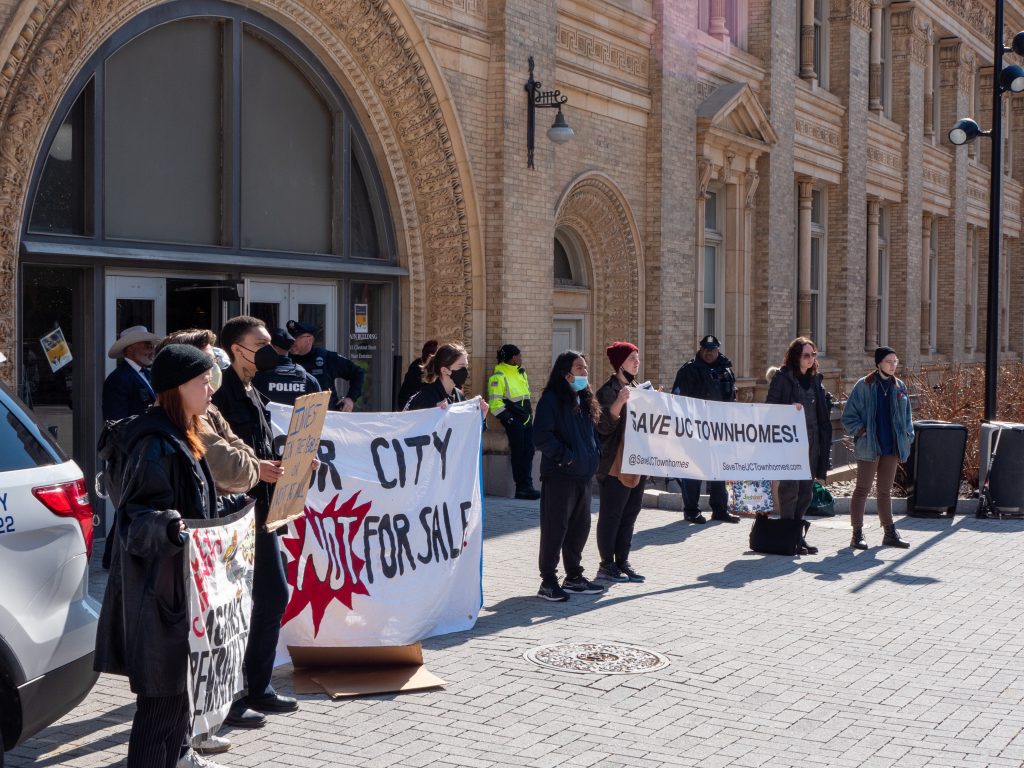
On Saturday, April 15, Drexel Community for Justice (DCJ) organizers handed out flyers on the sidewalk by the Daskalakis Athletic Center during Drexel University’s Admitted Students Day.
Student organizers spoke with prospective students and families about their fight to save the UC Townhomes. In a post to their Instagram account, @drexelforjustice revealed that later that evening, participants received an email from Drexel’s Student Conduct threatening them with disciplinary action for violating the University’s disorderly conduct policy.
This policy states “behavior that disturbs the peace,” including “interfering with a University activity” such as public events are prohibited.
Two days following their distribution of flyers, DCJ released a statement in response to Student Conduct’s reaction. In the statement, DCJ claims they did not interfere with nor disrupt the Admitted Students Day event, clarifying “this was not a protest,” but an “attempt to let admitted students know the role that Drexel plays in the displacement of Black, brown, poor and working-class communities in West Philly.”
During the event, an administrator confirmed that organizers did not have to leave, nor were they explicitly asked to. DCJ left the area “of [their] own accord” when “most families were inside of the DAC.”
DCJ is now calling on students and the Drexel community to “sign a statement of solidarity” for their following demands: (1) Drexel University drop all current Student Conduct cases against student protestors, (2) stop “intimidating” and charging students “peacefully demonstrating on campus” with disciplinary actions and (3) separate the Office of Student Conduct and Care from “Drexel administration and disciplinary processes.”
This latest news follows DCJ’s decision to end their 35 day sit-in protest at the Main Building on March 26.
In a previous post published to their Instagram account, DCJ revealed that on March 24, more than 20 student demonstrators involved in the sit-in received an email from Drexel’s student conduct. The administration threatened participants with suspension or a ban from campus if they did not vacate the Main Building by Sunday, March 26.
The decision to end the sit-in, which began on Feb. 21, was not easy.
“Drexel administration was clearly relying on student conduct as a means to end our organizing,” said Chelsea Martin, a DCJ organizer.
After analyzing the risks of disciplinary action, student organizers ultimately decided to end their sit-in.
“We didn’t want to limit how we’d be able to continue this fight,” said Martin.
Students faced a variety of student conduct policy violations and disciplinary meetings are ongoing.
“Chelsea and I were the first to get hit with something,” Shane Mosley, a DCJ organizer explained.
It happened after they had a chance encounter with a Drexel Board of Trustees member in the Main Building.
The short discussion with Martin and Mosley appeared to leave the unidentified Board of Trustees member “incredibly scared,” and he threatened to call the police. Martin and Mosley thought they had de-escalated the situation, but soon after that they received the first string of Student Conduct emails.
The first emails the administration sent out were directed to three students of color, including Martin, Mosley and Hana Kobyashi-Shapiro “much prior to any other students,” Martin claims. DCJ has a larger white population in the organization, and “despite us all acting the same,” students of color were targeted first.
“I think it’s racial profiling,” Mosley chimed.
“It’s not our interpretation of what happened — it materially did happen,” Martin added.
Although the reasons for this remain unclear, Martin believes the administration’s priority to target students of color first is “in alignment with why they’re failing to act to help preserve the townhomes.”
As for the UC Townhomes residents, they agreed that ending the sit-in was the right decision.
Mosley said, “Once the administration ramped up their threats, that’s when residents stepped in and said they don’t want us getting in trouble.”
“They’re definitely proud of us and share similar sentiments in terms of Drexel’s administration and their absolute disrespect for the residents of the townhomes,” Martin claimed.
The residents had been trying to contact the Drexel administration for months and finally met with President John Fry in January.
“During that meeting… John Fry said he was so sorry but then proceeded to do nothing,” Mosley said.
Since that meeting with President Fry, neither DCJ nor residents have heard anything from the administration about “material changes or steps that Drexel would be taking to help preserve the townhomes.”
After the sit-in began, organizers and residents only heard from former Senior Vice Provost for University and Community Partnerships Lucy Kerman. She spoke to organizers with the “sole purpose of getting us to leave,” Shane explained. It was revealed to DCJ that Kerman, who was in contact with a resident, texted them asking for help to get the student protestors to leave.
In the Student Conduct emails, the administration referenced a Philadelphia Inquirer article that claimed Drexel and the Townhomes residents reached a settlement.
“Drexel using that article as proof that things are solved is incorrect and incredibly ridiculous,” Mosley said.
Moving forward, DCJ plans to take their protests out on the streets and continue organizing on campus. Though they did not reveal much about their next steps, Martin said, “Expect to see us soon.”
“We’re not going anywhere. You haven’t seen the last of us,” Mosley stated.
As for Drexel students, DCJ hopes to see more involvement across campus.
“I’m sure you have a gripe or grievance with Drexel,” Mosley quipped. Whatever the issue, “we ought to be talking, we ought to be working together, and we ought to be organizing so that these problems don’t exist anymore.”


